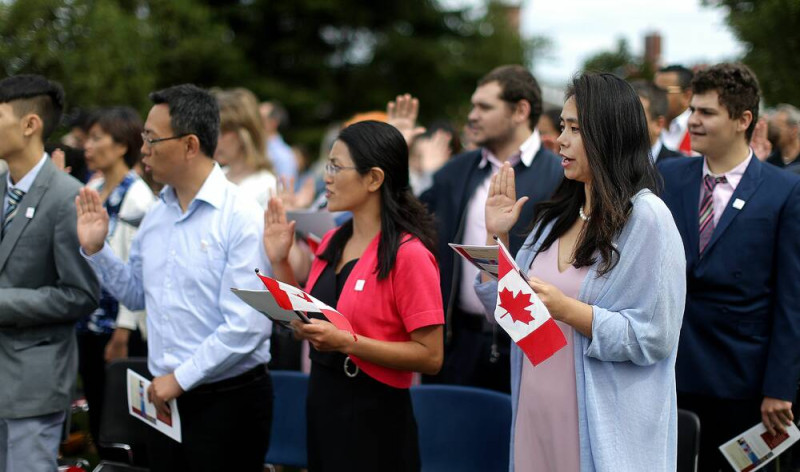Virtual vs. In-Person Citizenship Ceremonies

The debate over Canadian citizenship ceremony formats heats up
On This Page You Will Find:
- The emotional impact of virtual vs. in-person citizenship ceremonies
- Insights from recent petitions to restore in-person ceremonies
- Government responses and future possibilities
- Personal stories from new Canadians
Summary:
The clamor for in-person Canadian citizenship ceremonies is growing, as many believe the virtual format lacks the emotional resonance of a physical gathering. Greta Piazza, who recently became a Canadian citizen in Thunder Bay, shares that an in-person oath would have made the moment more significant. A petition led by Julie Hutka reflects a widespread sentiment that these ceremonies should not be overshadowed by digital convenience. The government maintains that both virtual and in-person options are available, but many are hopeful for a return to traditional ceremonies, which they feel better capture the gravity and joy of becoming a Canadian citizen.
🔑 Key Takeaways:
- Virtual ceremonies are perceived as less significant compared to in-person events.
- A petition seeks to restore in-person ceremonies for Canadian citizenship.
- The government claims to offer both formats based on demand.
- Personal stories highlight the emotional value of in-person gatherings.
- Community organizations play a vital role in supporting new citizens.
Greta Piazza remembers the day she became a Canadian citizen in Thunder Bay, Ontario, as a bittersweet experience. Originally from Arona, Italy, she had navigated life in several countries, including Spain, Portugal, and Ireland, before settling in Canada five years ago. Although thrilled to pass her citizenship test, Piazza felt something was missing when she took her oath online. "I would have been more happy to have it in person because it's a different feeling," she admits. For her, the presence of other new citizens, the judge, and the Canadian flags would have made the experience more tangible CBC News.
The Thunder Bay Multicultural Association (TBMA), which plays a pivotal role in preparing individuals for citizenship tests, has been organizing these virtual ceremonies since the onset of the COVID-19 pandemic. According to Cathy Woodbeck, the executive director of TBMA, demand was so high that they often held two ceremonies annually, accommodating between 100 and 120 candidates each CBC News.
The Push for In-Person Ceremonies
Julie Hutka, a resident of Thunder Bay, has initiated a petition to bring back in-person citizenship ceremonies. She argues that such a significant milestone deserves to be celebrated in person, surrounded by family and friends. Hutka recounts the surprise she felt when learning her relative's friend took the oath at a kitchen table. "I thought really, this is such a monumental moment in the long process to becoming a Canadian, that it is marginalized to such a small and lackluster event," she expressed CBC News.
The Government of Canada has responded to these concerns by stating its commitment to providing both meaningful in-person and virtual ceremonies across the country, based on operational considerations. Candidates can request a change of format, and efforts are made to accommodate such preferences Government of Canada. However, the official government webpage notes that most ceremonies are held virtually, with in-person events organized only when there is significant demand Government of Canada.
Community and Personal Significance
Cathy Woodbeck reflects on the joy that in-person ceremonies bring to her community. "These are probably the best things we get to attend," she says, highlighting the shared experience among staff, many of whom have gone through the citizenship process themselves. The anticipation of returning to in-person events is palpable, as Woodbeck hopes to plan such gatherings soon CBC News.
Greta Piazza, now an active member of her community as a language interpreter services worker, acknowledges the support she received from TBMA during her journey. She cherishes her life in northwestern Ontario, frequently enjoying Thunder Bay's marina and Kakabeka Falls. "Sometimes for a newcomer here, it's really challenging to know how to go through processes, and [the TBMA] have always been a good support to me," she shares, underscoring the vital role of community organizations in helping newcomers acclimate CBC News.
Conclusion
As the debate over the format of citizenship ceremonies continues, the stories of individuals like Greta Piazza and the efforts of advocates like Julie Hutka highlight the deeply personal nature of this rite of passage. While the government provides flexibility in ceremony formats, the hope remains for a future where in-person ceremonies once again become the norm, fully capturing the pride and joy of becoming a Canadian citizen.
 Author: Azadeh Haidari-Garmash, RCIC
Author: Azadeh Haidari-Garmash, RCIC
